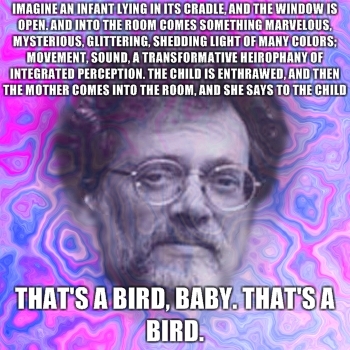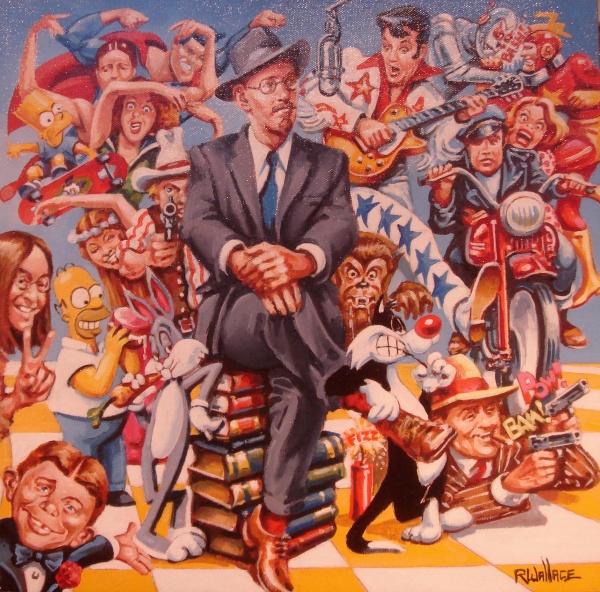Artwork by ROY WALLACE
Via DISINFORMATION:
“Joyce’s prose prepared me to enter psychedelic space.”
– Timothy Leary, FLASHBACKS“(Finnegans Wake is) about as close to LSD on the page as you can get…”
– Terence McKenna, Surfing on Finnegans Wake“If you’ve never had a psychedelic, reading Joyce is the next best equivalent.”
– Robert Anton Wilson, RAW Explains Everything“I have read Finnegans Wake aloud at a time when takers of LSD said, ‘that is JUST LIKE LSD.’ So I have begun to feel that LSD may just be the lazy man’s form of Finnegans Wake.”
– Marshall McLuhan, Q & A“Someday I’m going to get my article published; I’m going to prove that Finnegans Wake is an information pool based on computer memory systems that didn’t exist until centuries after James Joyce’s era; that Joyce was plugged into a cosmic consciousness from which he derived the inspiration for his entire corpus of work. I’ll be famous forever.”
– Philip K. Dick, The Divine InvasionMORE
23 THINGS TERRENCE MCKENNA SAID BEST FROM DMT SEX TO TELEPATHIC OCTOPI: At 25, a friend introduced me to “Surfing Finnegans Wake,” in which a nasally man lectures for three hours, ostensibly off-the-cuff, on the psychedelic, boundary-dissolving experience of reading James Joyce. I remember thinking his voice sounded extra-terrestrial. It was Terence McKenna. Here’s a quote from the lecture, which will hopefully be blurbed on the next jacket cover of Finnegans Wake: “This [Finnegans Wake] comes about as close as anybody came to pushing the entire contents of the universe down into approximately 14 cubic inches.” A year or so later, having forgotten about McKenna, I found the Psychedelic Salon, a podcast hosted by a friendly man named Lorenzo. It had hundreds of archived talks given by what seemed to be a community of people dedicated to psychedelics, and to a counter-culture movement of sorts. I wasn’t prepared to discover McKenna’s oeuvre. It was like I’d missed out on a grade level or college degree. He was, and still is, by way of these lectures and his books, one of the most well known psychonauts in recent history (up there with Timothy Leary and Alexander Shulgin). In his works, it’s clear that McKenna was a student of many things besides botany and entheogens. He was a renaissance man, capable of lecturing on literature, history, Western and Eastern philosophy,  linguistics, anthropology, ecology, shamanism, chemistry, biology. He had insight into our collective experience as technological creatures, and predicted a future world of virtual reality and simulation. He passed away in 2000, but I wish he could have been here for the Oculus Rift. He was a storyteller, a feminist and an environmentalist. A fair amount of his lectures are collected online here, and on YouTube, and the Psychedelic Salon. McKenna advocated for the “legalization of nature.” He thought it was dangerous to forbid access to any plant medicine. But he wasn’t ignorant of the addictive nature of heroin and cocaine, modern inventions that need regulation. MORE
linguistics, anthropology, ecology, shamanism, chemistry, biology. He had insight into our collective experience as technological creatures, and predicted a future world of virtual reality and simulation. He passed away in 2000, but I wish he could have been here for the Oculus Rift. He was a storyteller, a feminist and an environmentalist. A fair amount of his lectures are collected online here, and on YouTube, and the Psychedelic Salon. McKenna advocated for the “legalization of nature.” He thought it was dangerous to forbid access to any plant medicine. But he wasn’t ignorant of the addictive nature of heroin and cocaine, modern inventions that need regulation. MORE
RELATED: Terence Kemp McKenna (November 16, 1946 – April 3, 2000) was an American psychonaut, ethnobotanist, lecturer, and author. He spoke and wrote about a variety of subjects, including psychedelic drugs, plant-based entheogens, shamanism, metaphysics, alchemy, language, culture, technology, and the theoretical origins of human consciousness. He was called the “Timothy Leary of the ’90s”,[1][2] “one of the leading authorities on the ontological foundations of shamanism”,[3] and the “intellectual voice of rave culture“.[4] MORE

